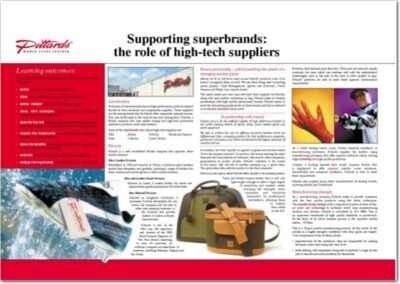
Producers of internationally known high performance products depend heavily on their materials and components suppliers. These suppliers are the unsung heroes that lie behind other companies’ popular success. This case study looks at the work of one such unsung hero: Pittards, a British company that uses skilled buying and high-tech production methods to produce world class leathers.
Some of the superbrands that rely on high-tech suppliers are:
- Nike
- Adidas
- FootJoy
- Marks and Spencer
- Puma
- Callaway
- Louis Vuitton.
Pittards is a well established British company that operates three related divisions:
Glove Leather Division
Established in 1826 and situated in Yeovil, it produces glove leathers mainly from sheepskin and goatskin, including a range of leathers for dress, military and service gloves as well as ladies footwear.
Shoe and Leather Goods Division
Situated in Leeds, it makes leather for shoes and luxury leather goods mainly from UK cattle hides.
Raw Material Division
Situated in Langholm (Scotland), it processes Scottish sheepskins for use within the company and for sale to other non-company tanneries i.e. the factories that process leather. It trades as Booth International.
Pittards is one of the UK’s top 100 exporters, and winners of the 2002 Trade Partners Exporter of The Year Award, exporting to over 30 countries. In addition it imports raw skins from 12 countries, including Ethiopia, Nigeria and the Sudan.
Almost all of us will have come across Pittards’ products, even if we haven’t recognised them as such. We see them being used by leading sports players: Colin Montgomerie (gloves and footwear), David Seaman and Philip Cocu (soccer boots).
The sports shoes you wear may well have been supplied by Pittards, along with your leather watchstrap or bag. Pittards seeks to develop partnerships with high quality international brands. Pittards needs to meet the demanding quality levels of these brands and this is reflected in its mission statement which reads:
In partnership with brands
Pittards aims to be the preferred supplier of high performance leather to the world? leading brands of gloves, shoes, luxury leather goods and sports equipment.
We seek to achieve this aim by offering innovative leathers which are differentiated from competing products by their performance properties, quality and consistency, and which are backed by the highest standards of customer service.
In business, the term ‘quality’ as applied to goods and services means ‘fit for the purpose required’. In practice, this means meeting the exact demands and requirements of customers, who may be other companies, governments or private citizens. Pittards’ customer is the owner of the brand, who will sell to another company e.g. a sports shop. The sports shop then sells the product to the final consumer.
Here are some ways in which Pittards offers ‘quality’ to its business partners.
Puma and Adidas require leather that is soft and lightweight enough to offer a high degree of sensitivity and comfort whilst retaining the strength, water resistance and durability demanded by professional footballer’s, allowing them to exhibit their skills to the full.
However, they demand more than that. They want not only soft, supple materials, but ones which can combine well with the sophisticated technologies used in the sole of the boot to allow players to grip. Pittards’ products are able to meet these rigorous ‘performance requirements’.
As a world leading brand, Louis Vuitton demands excellence in manufacturing processes. Pittards supplies the leather, using manufacturing processes that offer superior technical ability, leading edge technology and high quality production.
Camper, a leading Spanish shoe brand, requires leather that is engineered to offer superior comfort, water resistance, breathability and enhanced aesthetics. Pittards is able to meet these requirements.
Pittards also supplies many other manufacturers of leading brands, including Adidas and Timberland.
As a manufacturing company, Pittards seeks to provide customers with the best quality products using the latest techniques. The manufacturing strategy of the company is to invest in state-of-the-art plant and technology to underpin world class manufacturing facilities and abilities. Pittards is accredited to ISO 9000. This is an important benchmark of high quality standards in production. At the heart of its entire business process is the Japanese quality system – 20 Keys.
his is a 20-part quality manufacturing process. At the centre of the process is a highly energetic workforce with clear goals and targets. Vital components of the 20 Keys include:
- empowerment of the workforce: they are responsible for making decisions rather than being told what to do
- multi-skilling, with employees being able to perform a range of jobs and to identify and solve problems for themselves
- working in small teams, discussing and sharing ideas for improvement
- reducing work-in-progress, so that individuals are able to concentrate on tasks in hand. Work-in-progress refers to goods that are not fully made e.g. partly finished leather. By reducing work-in-progress a business is able to reduce the amount of capital tied up in stock at any one time
- a just-in-time system, so that materials arrive the moment they need to be worked on and are delivered when required for the next stage of production. The benefit is that stocks are not lying idle and getting in the way of vital production processes, as well as reducing waste and damage resulting from holding unnecessary stock levels
- a system of ‘kaizen’ or continuous improvement, so that everyone is constantly seeking to identify small steps to improve working practices. Kaizen involves trusting and empowering all members of an organisation to contribute ideas that can improve productivity, and at the same time helping to motivate employees because of the trust that has been vested in them
- the development of world class workers and manufacturing processes which are able to apply the latest technologies.
To be the ‘best’ in the modern world, firms have to be at the forefront of technological development. Pittards’ world class leather technology is a key business differentiator. Leather is a highly technical component. The best materials available are used to ensure that materials meet the requirements placed on them by the customers and end consumers.
Pittards prides itself on being at the leading edge of technological product development. For example, 30 years ago it began the development of WR100 technology, and over the years this has become increasingly more sophisticated. This technology is based on a detailed understanding of the fibre structure of leather. Processes are carried out which coat individual fibres to improve their performance, creating a leather finished product that is water resistant, breathable, with a low water uptake and which allows gloves and footwear to dry soft, quickly.
Leathers treated with WR100 technology are wind and rain resistant, while at the same time allowing sweat to escape from the hands. In addition, Pittards has incorporated state of the art thermal regulation technology into its leathers. This enables gloves and footwear to absorb heat from the hands and feet which is then stored in the materials. This enables the hands to stay cool, with obvious benefits to golfers, racing drivers, climbers etc.
An important part of production and technological excellence in the modern world is ensuring that the environment is protected. Pittards is committed to continuous improvement in environmental management. An environment management system is a clearly defined system setting out who is responsible for particular aspects of environmental management, and the key procedures involved in working towards specific targets and objectives. Environmental concern can thus be given priority in terms of working to achieve a triple bottom line for a company.
This has involved creating a balance between competing economic, social and environmental criteria. In a world in which organisations are increasingly aware of the need for sustainable business practice, Pittards is working with its partner brands, external auditors and others to continually improve standards.
Since 2000, Pittards has produced an annual Environmental Report highlighting environmental performance and progress. Pittards’ environmental policy sets out a commitment to the environment including annual reviews, open communication, and use only of hides and skins that are by-products of the meat, dairy and wool industries worldwide. The company is ISO 14001 certified, showing that it meets the international standards required for effective environmental management.
As a company heavily involved in supporting sporting excellence, Pittards sees carefully targeted sponsorship as an important ingredient of its business activity. A good example of this is the BT Global Challenge, a ten month Round The World yacht race in which crews fight against the prevailing winds. Pittards has been involved twice as a business sponsor of the race and with the aid of its partners has provided appropriate leather products such as gloves and footwear for this particularly demanding challenge because boats race ‘the wrong way’ round the world – against the prevailing winds and tides. Being involved in the race also allows Pittards to find out more about its products at ‘extreme’ levels, for example by investigating the impact of salt water on the leather products.
Results from this research enables the company to improve the qualities of its products. In addition, Pittards directly sponsors individuals including Jeanette Brakewell, Britain’s Olympic silver medallist at three day eventing. Pittards provides the leather in her saddle and gloves and is pleased to be associated with this highly successful individual.
Recently Pittards has been associated in some joint advertising activities with the big brands that it supplies. A common feature of the advertising has been an image of an individual faced by the elements and in a difficult situation – the adverts have the strapline:
‘It’s times like these you know why you chose Puma and why they chose leather created by Pittards!
This relationship advertising brings out the important part played in the supply chain by Pittards’ quality leather products. Advertising is an important part of the marketing mix. Communicating the strength of the brand through advertising and promotion, combined with the high quality of the product, premium pricing and well organised distribution systems all helps to give Pittards its high status.
Quality leather products provide comfort, and enable sports people and those who enjoy the outdoor life to better master the elements. Being able to use sophisticated gloves and footwear gives sports professionals (e.g. footballer’s, racing drivers) a high level of control.
Today’s sports and leisure industries generate vast revenues worldwide. These industries are characterised by highly competitive superbrands e.g. Nike, Adidas, Puma, Louis Vuitton. For the superbrands to be competitive they need to manufacture their products from the highest quality engineered materials. Pittards meets that need: the company is a vital business partner.
Not only sports people need high quality leather. Sophisticated leather products are found in a range of other consumer industries from hand luggage, to fashion gloves and watchstraps. High performance leathers therefore play a major role in the modern economy and in this industry Pittards is at the leading edge of research, development and delivery.
 Factors affecting organisational structure (PDF)
Factors affecting organisational structure (PDF)  Supporting superbrands: the role of high-tech suppliers (PDF)
Supporting superbrands: the role of high-tech suppliers (PDF) 